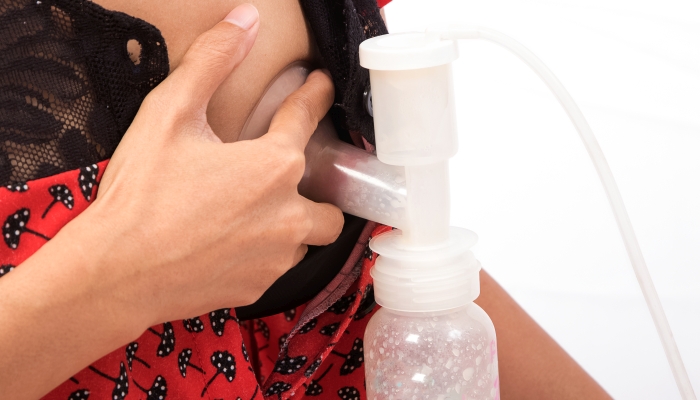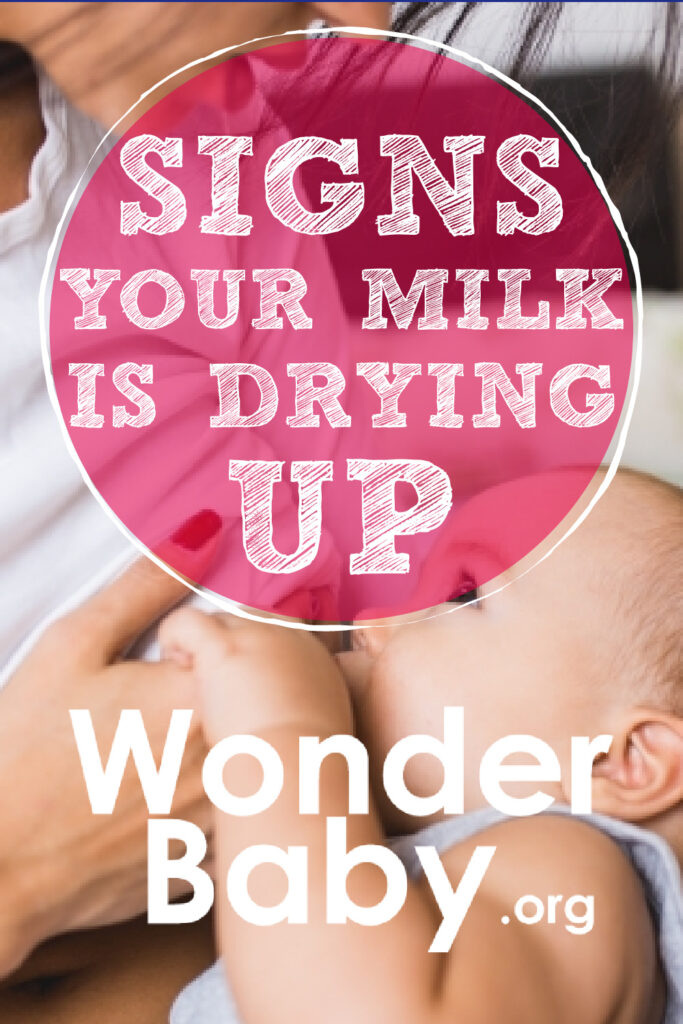3 Signs Your Milk is Drying Up

- Breasts go through different postpartum stages, which can be confusing. Some mothers feel concerned that their milk is drying up when it’s actually self-regulating.
- Stress, lack of sleep, and a poor diet are some of the biggest contributors to a low milk supply.
- Certain medications or medical conditions can limit or inhibit your milk production.
- Check your baby for signs of dehydration, as this is the most important factor and indicator of how much milk your baby is getting.
- If you see signs of dehydration or your baby isn’t gaining weight, consult your pediatrician immediately.
Whether you’re a first-time parent or experienced nursing mom, breastfeeding can come with all kinds of questions and concerns. Breastfeeding moms often worry about their milk supply and whether their baby is getting enough to eat.
It can be hard to know if you’re actually suffering from a low milk supply—because sometimes your body can trick you. We’ll go over signs that your milk is drying up and what you can do to increase your breast milk production.
Is Your Milk Supply Drying Up?
One of the most significant signs of low milk supply is if your baby stops gaining weight or begins losing weight. This, plus symptoms of dehydration, are the most vital risks to look for when breastfeeding a newborn.
This table will help you track the stages of weight gain for your baby:
| Age Range | Weight Gain |
| Newborns | 1.5 to 2 lbs. per month |
| 4 to 6 Months | 1 to 1.25 lbs. per month |
| 7 to 9 Months | 1 lb. per month |
| 10 to 12 Months | 13 oz. per month |
Consult your child’s pediatrician if you’re concerned that your baby isn’t gaining weight as he or she should.
Signs of Dehydration in Infants
Any signs of dehydration in infants are serious, and you should seek medical advice immediately if you see the following:
- Wetting fewer diapers than normal
- Dark urine
- Crying with little or no tears
- Dry mouth or skin
- Eyes look sunken
- The soft spot (fontanelle) on the top of the head looks sunken
- Crankiness, drowsiness, dizziness, lethargy
- Rapid breathing (occasionally occurs in infants)

What Can Cause Breast Milk to Dry Up?
You may not produce enough breast milk for many different reasons, but don’t worry! Often, you’re not actually losing your milk, and there are ways to try to boost supply and stay on your breastfeeding journey.
Factors that inhibit breastmilk production:
- Stress can cause a sudden drop in milk production due to excess cortisol (the stress hormone) in your body. Dealing with chronic stress can have long-term effects on breastfeeding.
- Lack of sleep limits your body’s ability to repair itself after birth and to produce enough milk. It’s also a daily struggle—and at times impossible—for new parents to get adequate sleep. This is why you need to prioritize sleep and take naps when you can. Establish a solid nighttime routine for yourself, not just for your baby, so you can fall asleep quickly and get deep sleep.
- Time away from your baby. Many moms struggle with busy schedules that don’t allow them to breastfeed for every feeding session. Many mothers experience a drop in supply when they return to work or have prolonged periods of the day away from their baby. You can remedy this by sticking to a pumping schedule while you’re away. It can be tricky to combine breastfeeding and pumping at first, but you’ll find a system that works for you. Try to breastfeed or pump at least every 4 hours.
- Not pumping enough to meet your baby’s demands can also cause your supply to drop.
- Improper diet. It’s essential to have a healthy, nutrient-dense, balanced diet to produce fatty breast milk for your baby. You need an extra 450-500 calories daily to make breastmilk, meaning you’ll need to consume around 2,500 calories daily. Don’t get caught up in trying to lose baby weight quickly. This can seriously put your milk supply at risk. Women who diet too harshly may experience lower quality, watery breast milk.
- Dehydration can also contribute to low supply. Make sure you drink lots of liquids and frequently eat healthy snacks when breastfeeding.
- Medications, while many are considered safe to take while breastfeeding, can cause problems with your milk supply. These include antihistamines, steroids, pseudoephedrine, and some oral contraceptives. Drinking alcohol and smoking tobacco can decrease your milk production also.
- Medical conditions for the mother like maternal obesity, premature birth, high blood pressure, hypoplasia, anemia, diabetes, thyroid disorders, or previous breast surgeries can cause problems with breastfeeding.
- Medical conditions for the baby like a tongue-tie, lip-tie, or cleft palate can interfere with breastfeeding, although generally these are diagnosed at birth. Consider other circumstances that can cause your baby to latch and unlatch repeatedly.
- Breastfeeding issues can arise from the act of breastfeeding and inhibit your milk production. Engorged breasts, clogged milk ducts, and mastitis can reduce your supply. Sometimes babies are easily distracted. Pacifiers can cause nipple confusion. Your baby may not get enough time at the breast or is suffering from teething or illness — all the above can cause breastfeeding problems.
- Hormones. When your period returns, you may experience a decrease in milk supply during parts of your cycle. Exclusively breastfeeding moms usually won’t have a period for about six months after birth, but it can happen sooner. If you’re breastfeeding and pregnant, you can see a dip in your milk supply at around four months (20 weeks) along.
- Thyroid issues. Many don’t realize that the thyroid plays a vital role in lactation. Underactive (hypothyroidism) or overactive (hyperthyroidism) can both cause a drop in milk supply or trouble with your let-down reflex.
How Long Does it Take for Your Breast Milk Supply to Dry Up?
Most women will see their milk supply drop in 2 or 3 weeks once they begin to wean their baby.
Some women will lose their milk supply in a few days. However, it depends on the reason for weaning. For example, some women wean their babies and can still express a few drops of milk even months later.
This time frame varies depending on your baby’s age and the amount of milk you were producing. It would likely dry up more quickly if you struggled to produce milk.

Signs Your Supply Is Not Actually Low (Even When It Feels Like It Is!)
If you’re struggling to breastfeed, don’t lose hope!
There are many ways your body and your baby can trick you into thinking you’re not producing enough milk when you actually are.
- Your breasts don’t feel full. Most exclusively breastfeeding mothers will produce more milk than their baby needs for the first 6 weeks of their newborn’s life. This is the “engorgement period,” when your breasts feel full and heavy. After about six weeks, this recedes and your breasts become softer. Some mothers worry that they’re losing their milk. This is perfectly normal, and most of the time, it isn’t a cause for concern.
- Your baby wakes up a lot to nurse at night. Nighttime wakeups are typical for babies of all ages, and breastfeeding in the middle of the night is one of the best things you can do to keep your milk supply flowing.
- Your baby’s feeding sessions are erratic. Just as you eat different amounts for different meals, your baby will also nurse more or less at varying times of the day.
- You don’t feel a “let-down” sensation. Some women never feel this—others say they sensed it in the early weeks and that the feeling decreased as their supply regulated.
- Your baby breastfeeds frequently. Breast milk is digested quickly (in around 90 minutes), so breastfed babies eat frequently. Newborns are prone to cluster feeding to meet their caloric needs during growth spurts.
- Your baby is excessively fussy. Babies get fussy for many reasons and only sometimes is it due to hunger. If you think your baby is upset because he is underfed, look for signs of dehydration and check that he’s gaining weight.
- You don’t pump. The amount of milk you get when pumping is not an indicator of your actual milk supply. A baby with a deep latch is more efficient at getting milk than a pump. Some women never respond well to pumps and still maintain a healthy milk supply.
- You don’t leak milk. Leakage and the need to use a breast pad often disappear once your milk supply regulates.
- Your feeding sessions are shorter. As babies grow, they get efficient at getting the milk out and take less time to nurse.
- Your baby can drink a bottle after breastfeeding. Many babies can and will do this if given the opportunity.
- Your baby nurses frequently. Cluster feeding is a behavior associated with growth spurts. Babies will nurse more often and longer for a few days to up to one week.
3 Signs Your Milk Supply Really Is Drying Up
Your Baby Isn’t Gaining Weight
It’s normal and expected for newborn babies to lose a little weight after birth. Typically, they’ll lose around 5–7% of their birth weight in the first several days postpartum.
After the fourth day, they should start to change direction and be back to their birth weight around two weeks old. After this, expect your baby to gain anywhere from 4–7 ounces weekly on average.
If your baby lost more than 10% of his birth weight in the first couple of days and hasn’t started putting on weight 5 to 6 days postpartum, consult his pediatrician.
Also, you’ll want to speak to his doctor if you note your baby displaying poor weight gain over time.
Your Baby Uses Fewer Diapers
If your baby is not peeing or pooping enough for his age range, it’s a sign that he’s not getting enough nourishment. Around one week old, your baby should soil between 6–8 diapers per 24 hours.
Your Baby is Dehydrated
Look for any previously mentioned signs of dehydration, as this is an immediate health concern.
How to Prevent Your Milk Supply from Drying Up Too Early
If you’re experiencing a sudden drop in milk supply, it doesn’t mean you have to stop breastfeeding altogether. There are several techniques to try to boost your production.
- Self-care: Get as much sleep as possible, eat a healthy diet, drink lots of water, and manage your stress. Don’t hesitate to seek the help of friends and family to help with child care.
- Take care of your mental health: Millions of new mothers experience postpartum depression and anxiety. If you’re struggling, talk to your healthcare provider about resources, including talk therapy or medication.
- Breastfeed often: The secret to a strong milk flow is frequently nursing (or pumping). If your milk supply is decreasing, try to nurse more often and encourage longer sessions.
- Take a day off to bond: A day or two of bonding with your baby, allowing them to nurse on demand can help with milk supply.
- See a lactation consultant: A breastfeeding expert can help you with many issues, from not getting enough milk to poor latching. They have so many wonderful tricks and tips that can benefit you.

What to Do if Your Milk is Drying Up and You’re Exclusively Pumping
If you only pump and your milk supply is decreasing, try these solutions:
- Add an extra pumping session. Also called power pumping, it can boost supply by upping the demand. Some moms have success with pumping early in the morning before their baby wakes up.
- Prioritize pumping. Pumping at work in the middle of meetings and a busy schedule can be frustrating. If possible, schedule your pumping breaks and stick to them. Consistency is key to keep the milk flowing.
- Check your pump. Pumps break down or can become less efficient over time. A lactation consultant can often spot issues with your pump, or you can contact the manufacturer.
- Lots of skin-to-skin and smelling your sweet baby’s smell is perfect for boosting milk production. Exclusively pumping doesn’t mean you can’t take the time to snuggle with your little one.
How Can You Boost Your Milk Supply?
Here are a few more solutions for milk production:
- Let your baby nurse on demand. Newborns will eat 8-12 times in a 24-hour day. Let them cluster feed, as this is great for your milk production.
- Check your baby’s latch.
- Offer both breasts at every nursing session.
- Empty your breasts every time you nurse. If your baby stops nursing, hand express or pump to draw out the remaining milk and signal your body to make more.
- Avoid nipple confusion; don’t use bottles or pacifiers for at least six weeks.
- Sleep as much as possible.
- Relax before nursing and hold your baby. Massaging your breasts before nursing will encourage the let-down.
FAQs
Why does breast milk supply tend to dry up at night?
The hormone level that signals the breasts to make milk, called prolactin, drops at night. If you go all night without nursing, it can be hard to get prolactin levels back up.
Does having softer breasts mean your milk supply is drying up?
No, this is most often a normal regulation of the milk supply around the time your baby is 6–12 weeks old. Your milk supply comes in forcefully at the beginning (the engorgement period) and then adjusts to your baby’s needs.

The information WonderBaby provides is not intended to be, and does not constitute, medical or other health advice or diagnosis and should not be used as such. Always consult with a qualified medical professional about your specific circumstances.
Related Posts

Breastfeeding, Sleep
Sleep and Breastfeeding: A Comprehensive Guide for Nursing Moms
Many people assume breastfeeding and sleep training don’t go together, but it is possible to help your baby sleep better while continuing your breastfeeding journey.

Breastfeeding
Comfort Nursing: Pros, Cons, and How to Stop
Find out what comfort nursing is, when should you worry about it, and how to stop or limit your baby's comfort nursing (especially at night!).

Breastfeeding, Product Reviews
5 Best Breastfeeding Chairs for Nursing Moms of 2023
Whether you want a gentle rock, a smooth glide, or a cozy cuddle to soothe your baby to sleep, you’ll have your pick of the best breastfeeding chairs on the...